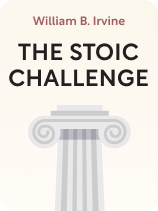

This article is an excerpt from the Shortform book guide to "The Stoic Challenge" by William B. Irvine. Shortform has the world's best summaries and analyses of books you should be reading.
Like this article? Sign up for a free trial here.
Do you feel uneasy stepping outside your boundaries? How can you expand your comfort zone?
To use adversity as an opportunity to grow, William B. Irvine recommends that you undergo training that expands your comfort zone. It might sound scary to look for uncomfortable situations, but it’s necessary to experience delight in a wide range of situations.
Discover how to expand your comfort zone below.
Seek Out Direct Discomfort
Whereas challenge-based training has you seeking possible adversity, this training involves going out of your way to get uncomfortable. When you learn how to expand your comfort zone, the adversities won’t be unexpected (you’ll train for that as above) but rather intense and challenging.
(Shortform note: When thinking about what sorts of stressors you might expose yourself to, consider the Yerkes-Dodson law—a psychological principle stating that stress benefits performance, but only up to a point. When you experience just the right amount of good stress, or eustress, you’ll have sufficient motivation to work well or face up to some challenge. When eustress tips over into distress, however, you’ll become physiologically too uncomfortable to perform. Given this, don’t jump into the deep end all at once. Rather, start with just a bit of stress, then ratchet up the difficulty until you have a good sense of your own tolerance curve.)
Irvine explains that actively seeking adversity will expand your comfort zone, empowering you to remain tranquil and even experience delight in a wider range of circumstances. The greater the levels of intensity you can get used to, the better equipped you’ll be to handle intense, real-world adversities. This training has two dimensions: emotional toughening and physical toughening.
Emotional toughening is when you practice facing your fears in order to expand your comfort zone. Irvine recommends that you gradually expose yourself to what you’re afraid of (such as handling dogs) and intensify the challenge over time.
(Shortform note: Pivoting away from the “toughness” framing, Irvine’s recommendation sounds a lot like modern exposure therapy. Exposure therapy can help with conditions including PTSD, generalized anxiety disorder, and obsessive-compulsive disorder (OCD), and it ranges from the gradual form (described above by Irvine), called graded exposure, to “flooding,” or an all-at-once confrontation with the object of your fear.)
Physical toughening is when you train your body by exposing yourself to increasingly intense physical stressors. Irvine suggests extreme temperature training, physical exercise, dieting and fasting, and endurance training.
(Shortform note: For one specific approach to physical toughening, you might try the techniques outlined in The Wim Hof Method. This method involves intense cold exposure, breathwork patterns, and mindset practice—all of which contribute to a serious physical toughening of your body.)
Irvine explains that an added benefit of training in these ways is that the Stoics would experience greater pleasure from lesser indulgence. That is, toughening yourself up with Stoic-style training—living in bare, austere conditions and seeking out challenges—has the side effect of making worldly pleasures seem all the more wonderful if they happen to come along.
In contrast, people who constantly indulge grow used to pleasure and thereby lose their ability to enjoy it. They become so physically and emotionally soft that even slight discomfort will seem unbearable. According to Irvine, this implies that in the long run, intentionally seeking and getting used to discomfort reduces it better than avoiding it does.
(Shortform note: Here, Irvine’s ideas evoke the notion of the hedonic treadmill, a theory from psychology that explains why pleasures and hardships tend not to make much difference to our long-term happiness or unhappiness. In short, our brains gradually adapt to repetitive experiences of pleasure or displeasure until they seem more or less normal. In practice, this explains why the honeymoon phase of a relationship always ends, or why the third cookie doesn’t taste quite as good as the first. With regard to Irvine’s work, it means that the ancient Stoics were right—an endless pursuit of pleasure doesn’t increase your happiness and, in fact, might do the opposite.)

———End of Preview———
Like what you just read? Read the rest of the world's best book summary and analysis of William B. Irvine's "The Stoic Challenge" at Shortform.
Here's what you'll find in our full The Stoic Challenge summary:
- How you can minimize suffering by reframing it
- How you can use the Stoics’ strategy in your everyday life
- Why you should take any good fortune in stride






